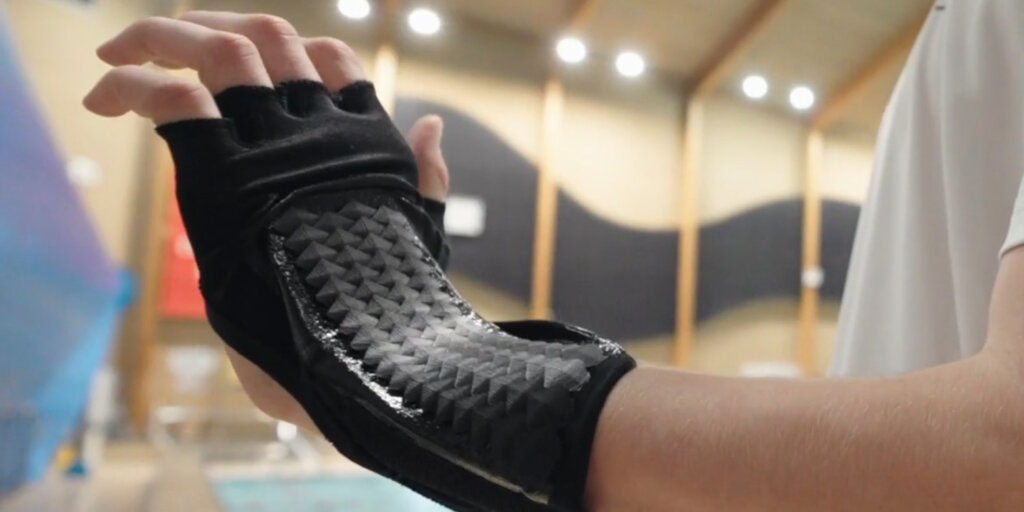Home » When nature inspires innovation – MaRS Discovery District
When nature inspires innovation – MaRS Discovery District

U.K.-based SCALED is bringing its animal-inspired protective sports gear to the North American scene.
Natalie Kerres’s eureka moment took place when she was more than 9,500 kilometres from home. On a placement in Tokyo for her master’s in global innovation design, which combines science, engineering and art to solve problems, she learned Japan’s famed bullet trains are designed using a technique known as biomimicry. The long, aerodynamic locomotive noses are modelled after the kingfisher. Just like the bird’s slender beak helps it dive through the water’s surface, the bullet train’s nose makes it more aerodynamic. Kerres, a former jewellery designer, found her new inspiration. Except she didn’t want to make fancy earrings or help trains go even faster. Instead, she wanted to find better a way to protect athletes from injury.
Growing up, Kerres dabbled in everything from volleyball to equestrian vaulting, and knows that staying active goes hand-in-hand with injury prevention. So, she set out to realize her vision of turning cumbersome sports equipment into a product that allows for more flexibility, while keeping users safe. In 2020, she founded the athletic tech company SCALED.
Kerres started by asking a series of questions. “How can we support rehabilitation while making it less stigmatizing?” she recalls. “What if protective clothing actually makes you stronger?”

Using biomimicry as a guide, Kerres got to work, taking inspiration from the pangolin, an armadillo-like mammal, whose tough, overlapping scales were once used to create armour. Kerres also points out how scales are different depending on the animal, their environment and the predators they’re up against. “I thought it was really fascinating how nature’s evolutionary process figured out how to adapt to different challenges,” she says.
Eager to change the one-size-fits-all approach of the sports equipment industry, Kerres and her team developed software that designs and 3D-prints interlocking protective scales made of durable, yet biodegradable plastic made from cornstarch. For top-tier athletes, the material is upgraded to a nylon/carbon fibre mix for greater support. These wearable scale patches are customized for each user to restrict mobility beyond the angle where breaks, sprains and overextensions are most likely to occur, while maximizing mobility and range of motion.
The result looks like a patch of heavy-duty scales, like something Aquaman would wear. SCALED can sew these patches into everything from gloves to cycling shorts and even socks. For the more serious athlete, these rigid, yet flexible scales can be adhered right onto the skin using medical tape.
The SCALED team first focused on hands. The company’s wristguards, which have protective scales built right into a glove, can help everyone from wipe out–prone snowboarders to Olympic-bound divers plunging hand-first into the water.
“Diving is a really underserved market. A diver’s wrist protection is either a piece of foam, lots of tape or sometimes just wrapping a t-shirt around the wrist,” says Kerres. “It’s not really comfortable and might not do its job, so a lot of divers don’t wear it.” A SCALED glove will keep a diver’s hand at a safe angle when it hits the water, and protect a snowboarder when they fall. The team is also working to expand its line of products to include complex joints like knees, where ACL injury and recovery times sideline — and often end — sports careers.
Today, Kerres says SCALED is gaining traction with athletes and sports organizations in Europe, and has earned the attention of Red Bull and the Canadian Olympic Diving Team — great news for a company eager to tap into North America, which claims nearly a third of the U.S.$331-billion global sports equipment market.
The company has teamed up with MaRS and Innovate UK, a program that gives U.K.-based entrepreneurs a crash course in everything from launching a business in a foreign market to landing crucial connections and partnerships.
Through the program, Kerres and her team have worked on finessing the product-market fit, preparing for investor pitches and scouting out sport brands that might want to incorporate the company’s technology into existing products. “We want to partner with a company that shares the same values as us,” says Kerres. “A company that strives for performance.”
That passion and drive is what makes SCALED stand out from the competition, says Morgan Lorimer, senior manager of cohort programs at MaRS. “Natalie is an exceptional founder. She advocates for her business with dedication, curiosity and adaptability,” says Lorimer. “Having worked with thousands of founders, I’m confident those traits, coupled with her passion, means she will be successful wherever she goes.”
SCALED has patented its technology in the U.K., “and we’ve filed for international expansion,” says Kerres. “The next 12 to 18 months are going to be really exciting when it comes to our go-to-market strategy, and hopefully having our product in stock.”
But if you ask Kerre’s what her biggest win is, she says it’s seeing her product put into practice. “Seeing someone wear it and use it is one of the most exciting parts for me,” she says. “It’s really satisfying seeing that it helps someone.”
Learn more about how MaRS and Innovate UK are bringing new breakthroughs to Canada.
Photos courtesy of SCALED.
MaRS Discovery District
https://www.marsdd.com/
MaRS is the world's largest urban innovation hub in Toronto that supports startups in the health, cleantech, fintech, and enterprise sectors. When MaRS opened in 2005 this concept of urban innovation was an untested theory. Today, it’s reshaping cities around the world. MaRS has been at the forefront of a wave of change that extends from Melbourne to Amsterdam and runs through San Francisco, London, Medellín, Los Angeles, Paris and New York. These global cities are now striving to create what we have in Toronto: a dense innovation district that co-locates universities, startups, corporates and investors. In this increasingly competitive landscape, scale matters more than ever – the best talent is attracted to the brightest innovation hotspots.


